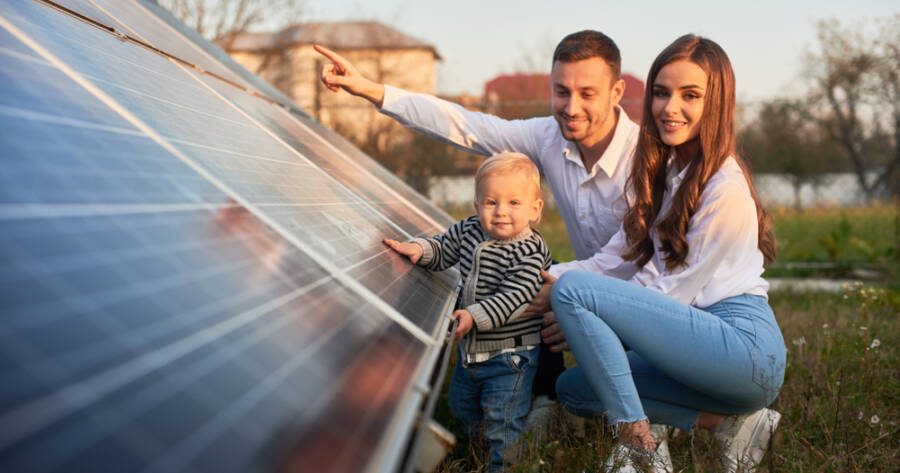Transitioning to solar energy has become a popular choice for homeowners looking to reduce their utility bills and minimize their carbon footprint. While the upfront cost of solar panels can be a consideration, many find that the long-term savings and environmental benefits make it a worthwhile investment. Could solar panels eventually pay for themselves? Let’s explore how solar technology works, the potential financial savings, and the factors to consider before taking the leap.
How Do Solar Panels Work?
Solar panels are devices that convert sunlight into electricity. Using photovoltaic (PV) cells, they capture energy from the sun and transform it into usable power for your home. These panels are typically installed on rooftops or other sunlit areas and are connected to an inverter, which converts the energy into a format compatible with household appliances.
One of the most attractive features of solar energy is its renewable nature. The sun provides a consistent, free source of energy, which—in theory—could significantly reduce your reliance on traditional energy providers. This shift not only helps in cutting monthly electricity bills but also contributes to a more sustainable planet.
Financial Benefits: Can Solar Panels Really Save You Money?
Energy Bill Reductions
Many homeowners notice a drop in their energy bills after installing solar panels. The degree of savings often depends on factors such as your home’s energy usage, the size and efficiency of your solar panel system, and the amount of sunlight your location receives. For example, in areas with abundant sunshine, it’s possible to offset a significant portion of your electricity consumption with solar power.
Incentives and Rebates
Government programs and incentives may be available to help reduce the initial cost of solar installation. Tax credits, rebates, and other benefits often aim to make solar panels more accessible to homeowners. Although these vary by region and may change over time, they can contribute significantly to lowering the payback period for your system.
Long-Term Payback
The phrase “solar panels pay for themselves” refers to the point at which the savings on electricity bills equal the initial installation cost. This timeframe can vary widely, ranging from 5 to 15 years, depending on energy prices, system size, and local incentives. While there is no universal timeline, many homeowners find that the combination of reduced utility bills and available rebates make solar a sound investment.
Factors That Influence Solar Panel Payback
Location and Climate
Sunlight is the critical ingredient for solar panels. Regions with high solar irradiance, such as areas with consistently sunny weather, tend to yield better results. If your home is located in a place with frequent cloud cover or obstructions like tall trees, your system’s efficiency might be reduced.
Installation Costs
Installation costs can vary depending on the size of the system, the type of panels you choose, and labor expenses in your area. It’s important to get quotes from multiple installers to compare pricing and options. Keep in mind that cheaper options may not always offer the best efficiency or durability.
Maintenance and Longevity
Solar panels are relatively low-maintenance, but occasional cleaning and inspections are necessary to ensure optimal performance. A well-maintained system can last 25 to 30 years, meaning that most homeowners will have ample time to see a return on their investment. Additionally, warranties often cover performance issues for a significant portion of the panel’s lifespan, offering further peace of mind.
Energy Consumption Habits
Your household’s energy usage patterns also play a role in determining savings. If you consume most of your energy during the day when the panels are actively generating power, you’re likely to see greater benefits. Installing a battery storage system can further enhance your savings by storing excess energy for use at night or during peak demand periods.
Environmental Impact: A Bonus Benefit
In addition to potential financial savings, solar panels offer significant environmental benefits. By harnessing the power of the sun, you’re reducing your reliance on fossil fuels, which are a major source of greenhouse gas emissions. Over the lifespan of a solar panel system, the reduction in carbon emissions can be substantial.
For those passionate about sustainability, switching to solar can be a rewarding step toward living a greener lifestyle. Additionally, adopting solar energy may inspire others in your community to explore renewable options, creating a ripple effect of positive environmental change.
Are Solar Panels Right for You?
While the potential for savings is appealing, solar panels aren’t a one-size-fits-all solution. Factors such as your roof’s condition, available sunlight, and local energy costs should be carefully evaluated. It’s worth consulting with a reputable solar provider to assess your home’s suitability and obtain a customized plan.
If upfront costs are a concern, financing options and solar leases are available. These can lower initial expenses, though it’s important to understand the terms and conditions to ensure they align with your long-term financial goals.
A Bright Future Awaits
Investing in solar panels offers an opportunity to save money, reduce your environmental impact, and increase your home’s energy independence. While the journey to break-even can vary based on numerous factors, many homeowners find that the benefits outweigh the initial costs in the long run. By carefully evaluating your needs and exploring available incentives, you can determine whether solar energy is the right fit for your household.
As renewable energy technologies continue to advance, solar power is becoming increasingly accessible and effective. If you’ve been considering making the switch, now might be the perfect time to explore your options. With careful planning and the right setup, solar panels could indeed pay for themselves—and even generate additional value over their lifetime.
